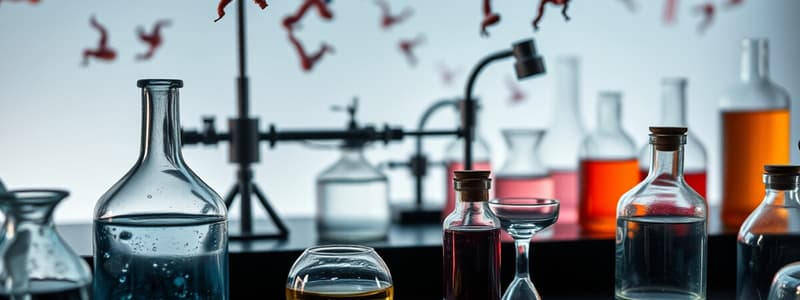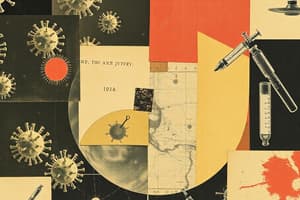Podcast
Questions and Answers
What does the germ theory state about microorganisms?
What does the germ theory state about microorganisms?
- They are only present in unsanitary conditions.
- They are harmless and do not affect human health.
- They can be seen without technological aid.
- They can invade the body and cause disease. (correct)
Which scientist is known for the first vaccination practices using cowpox?
Which scientist is known for the first vaccination practices using cowpox?
- Robert Koch
- Edward Jenner (correct)
- Louis Pasteur
- Gregory Mendel
What did Robert Koch's postulates establish?
What did Robert Koch's postulates establish?
- A link between specific microbes and diseases. (correct)
- The psychological factors of illness.
- The environmental impact on disease spread.
- A theory about the evolution of diseases.
Which organism did Koch specifically associate with cholera?
Which organism did Koch specifically associate with cholera?
What was revealed by the Hershey and Chase experiment?
What was revealed by the Hershey and Chase experiment?
What condition is associated with Helicobacter Pylori?
What condition is associated with Helicobacter Pylori?
What disease is Porphyromonas gingivalis associated with?
What disease is Porphyromonas gingivalis associated with?
What does the study of Chlamydia pneumoniae suggest about its effects?
What does the study of Chlamydia pneumoniae suggest about its effects?
What question related to HIV is posed regarding its pathogenicity?
What question related to HIV is posed regarding its pathogenicity?
Which microorganism is associated with Crohn's disease according to the shift model of causality?
Which microorganism is associated with Crohn's disease according to the shift model of causality?
What did Anton Von Leeuwenhoek first view using his microscope?
What did Anton Von Leeuwenhoek first view using his microscope?
Which experiment conducted by Francesco Redi aimed to disprove spontaneous generation?
Which experiment conducted by Francesco Redi aimed to disprove spontaneous generation?
What was Needham's conclusion after repeating Redi's experiment?
What was Needham's conclusion after repeating Redi's experiment?
How did Spallanzani refute Needham's findings?
How did Spallanzani refute Needham's findings?
Which key theory did Pasteur develop from his experiments?
Which key theory did Pasteur develop from his experiments?
According to Pasteur, what was responsible for microbial growth in his experiments?
According to Pasteur, what was responsible for microbial growth in his experiments?
What process did Pasteur develop to prevent spoilage in food and drinks?
What process did Pasteur develop to prevent spoilage in food and drinks?
What did Redi's experiments indicate about the relationship between flies and maggots?
What did Redi's experiments indicate about the relationship between flies and maggots?
What criticism did Pasteur have regarding Spallanzani's experiment?
What criticism did Pasteur have regarding Spallanzani's experiment?
Which of the following organisms was linked to a specific disease by Pasteur?
Which of the following organisms was linked to a specific disease by Pasteur?
Study Notes
Early Discoveries in Microbiology
- Anton von Leeuwenhoek (d. 1650) created the first true microscope with a 20x lens, leading to the observation of single-celled organisms, termed "animalcules."
- Robert Hooke's Micrographia (1665) marks a significant advancement in understanding microorganisms.
Experiments against Spontaneous Generation
- Francesco Redi (1668) determined that maggots are caused by flies, not decaying meat, using flasks with varying exposure to air and flies, disproving spontaneous generation (SG).
- John Needham (1745) attempted to refute Redi, heating broth in sealed flasks, but falsely attributed microbial growth to a "vital force," supporting SG.
- Lazzaro Spallanzani (1760) countered Needham by boiling and sealing broth, showing no microbial growth, suggesting that air or dust is responsible for contamination, denying SG.
Germ Theory and Its Development
- Louis Pasteur (1857) refuted Spallanzani’s conclusions, demonstrating that dust, not air, carried germs into boiled broth using a specially designed flask. His work led to the development of the Germ Theory of Disease, generalizing that microorganisms cause disease.
- Pasteur also introduced Pasteurization, aimed at preserving food and preventing spoilage, and linked vibrio cholera to puerperal fever, paving the way for understanding pathogenic relationships.
Vaccination and Disease Etiology
- Edward Jenner (1796) pioneered vaccination by exposing a boy to cowpox, later protecting him from smallpox, marking a significant breakthrough in immunology.
- Robert Koch (1880) provided evidence linking specific microbes to specific diseases (e.g., cholera, anthrax, rabies) through his postulates, establishing microbiological disease criteria.
Advancements in Microbial Genetics
- The Hershey and Chase experiment (1953) demonstrated DNA is the genetic material by labeling either protein or DNA in bacteriophages and tracing it into the E. coli cells.
- The Urey-Miller experiment recreated early Earth conditions, producing amino acids essential for life, contributing to the understanding of biogenesis.
Modern Microbial Associations
- Helicobacter pylori linked to gastric ulcers and cancer by thriving in the stomach’s non-acidic mucin layer.
- Porphyromonas gingivalis identified as a contributor to tooth decay.
- Chlamydia pneumoniae linked to atherosclerosis.
- Mycoplasma and Borrelia burgdorferi associated with rheumatoid arthritis.
- Mycobacterium avium linked to Crohn’s disease, illustrating complex causality models in chronic conditions.
Critical Reflection
- Examining HIV's relationship to AIDS raises questions about causality in microbiological research, especially in the absence of an animal model.
Studying That Suits You
Use AI to generate personalized quizzes and flashcards to suit your learning preferences.
Related Documents
Description
Explore the groundbreaking discoveries in early microbiology, from Anton von Leeuwenhoek's microscope to Louis Pasteur's contributions to germ theory. This quiz covers key experiments and concepts that shaped our understanding of microorganisms and the refutation of spontaneous generation. Test your knowledge on these pivotal moments in science!




